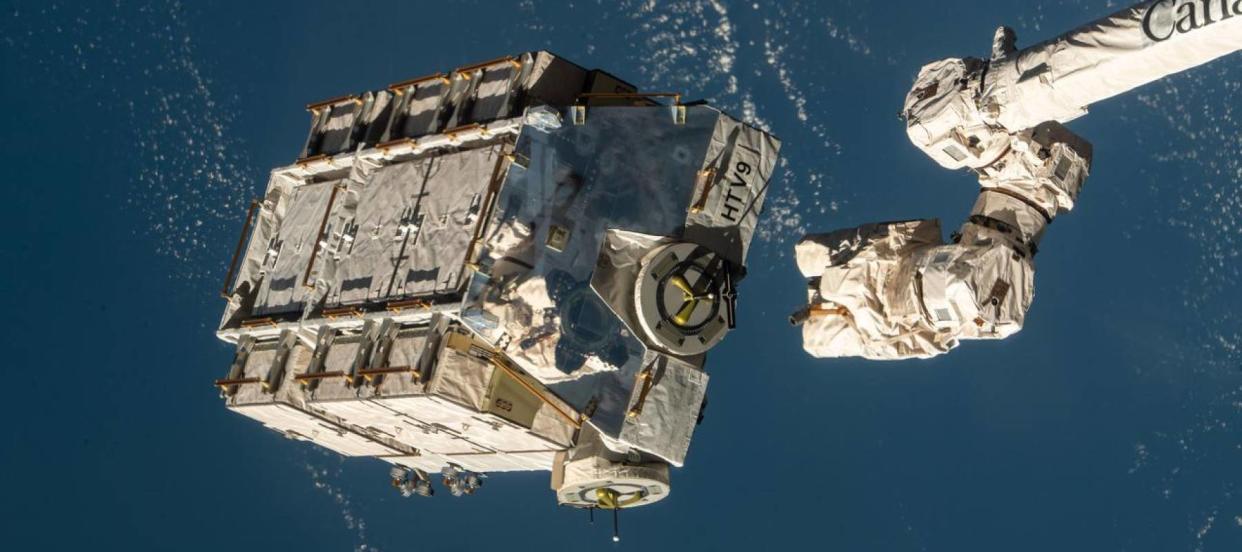‘We are in the process of sending NASA our claim’: Space junk smashed into a Florida man’s home and caused over $15K in damages — does insurance have to pay for it?

Space junk is the new frontier in insurance claims.
In March, a mysterious object crashed through the roof of Alejandro Otero’s home in Naples, Florida.
Don't miss
Commercial real estate has beaten the stock market for 25 years — but only the super rich could buy in. Here's how even ordinary investors can become the landlord of Walmart, Whole Foods or Kroger
Cost-of-living in America is still out of control — use these 3 'real assets' to protect your wealth today, no matter what the US Fed does or says
These 5 magic money moves will boost you up America's net worth ladder in 2024 — and you can complete each step within minutes. Here's how
Upon recovering it, NASA said it was a piece of hardware from a pallet packed with old batteries that was jettisoned from the International Space Station three years ago by its ground controllers.
A little smaller than a soda can and made of superalloy Inconel, the hunk of metal weighed just 1.6 pounds. However, Otero told NPR it caused the whole house to shake when it landed in his floorboards.
His homeowners’ insurance set the adjusted cost of the damage at more than $15,000, and Otero is evaluating other damages not covered by insurance.
“We are in the process of sending NASA our claim which will include the insurance and non-insurance damages,” Otero told NPR.
'This is kind of unprecedented'
There are approximately 45,000 objects in orbit, including some 18,800 pieces of space debris, being tracked by the U.S., according to Space-Track.org, the public website of the U.S. Space Command.
It’s possible that some of that debris or those objects could crash into your home. But it’s not very likely, Mark Sundahl, space law expert, told NPR.
Read more: Jeff Bezos and Oprah Winfrey invest in this asset to keep their wealth safe — you may want to do the same in 2024
You may not realize it, but large space objects reenter the atmosphere once a week, according to the European Space Agency. The objects and their fragments usually burn up before reaching Earth, posing little to no threat to humans and their homes.
NASA said the hardware that hit Otero’s home was also expected to fully burn up during entry through Earth’s atmosphere on March 8 this year.
Sundahl recalls a similar incident to Otero’s happening back in 1978. A Soviet satellite, Kosmos 954, “disintegrated over Canada and scattered radioactive fuel across the country.”
Luckily, an international convention on liability for damage caused by space objects had been created in 1972. The convention states that the launching state would be the liable party to pay for damages. So the Soviets cleaned up the mess in Canada and paid for the expenses.
The stanchion that hit Otero’s house was from NASA flight support equipment, making it America's responsibility. But that makes things slightly more complicated.
"This is kind of unprecedented," Sundahl told NPR. According to him the international law no longer applies. “It becomes a domestic legal issue, and a homeowner would have to bring a tort action against the federal government.”
Otero says his lawyers have been in touch with NASA’s legal counsel. The matter is yet to be determined.
Disasters such as hurricanes, earthquakes, and now space junk crashes, could damage your home in the future. Here’s how to prepare.
How to prepare for natural disasters
Otero luckily had homeowners’ insurance and his insurer quickly helped in repair work, according to NPR.
Space junk may have a low likelihood of landing on your home, but “acts of God” or natural disasters do happen. There were 28 billion-dollar natural disasters in the U.S. last year alone, according to the NOAA National Centers for Environmental Information (NCEI). The Insurance Information Institute lists wind and hail, fire and lightning, and water damage and freezing as the top causes of home insurance losses.
Make sure that you have your home insured. Experts recommend also making an inventory of the posessions in your home.
If you already have home insurance but you haven’t reviewed your policy in the last six months, it might be time to give it a glance — and ensure you’re covered for all types of unexpected damage. For instance, flood and earthquake damage is typically not covered by home insurance.
With more and more extreme weather events affecting the U.S., having a solid home insurance policy can save you a lot of money if anything strikes your home. There are also ways to prepare you home, like installing reinforced doors and windows.
It's also important to bulk up your emergency fund. Experts advise maintaining a financial cushion worth three to six months of expenses, but you may benefit from bulking it up. “If you live in a disaster zone, where you’re more likely to have hurricanes, tornadoes or expected events, you should have larger cash reserves,” said Jaime Eckels, a certified financial planner at Plante Moran Financial Advisors, to CNBC.
What to read next
Car insurance premiums in America are through the roof — and only getting worse. But 5 minutes could have you paying as little as $29/month
Jeff Bezos, Mark Zuckerberg, and Jamie Dimon are selling out of US stocks in a big way — here's how to diversify into private real estate within minutes
'It's not taxed at all': Warren Buffett shares the 'best investment' you can make when battling rising costs — take advantage today
This article provides information only and should not be construed as advice. It is provided without warranty of any kind.
